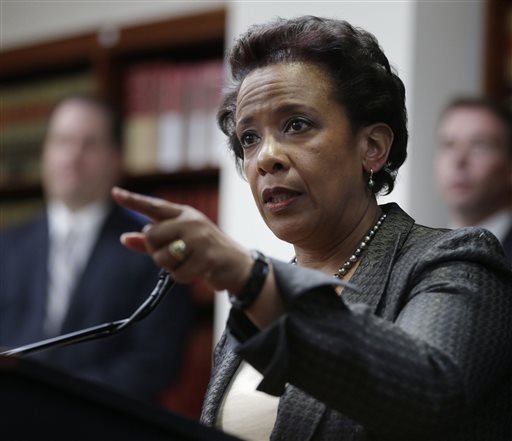Loretta Lynch, President Barack Obama’s choice to replace Eric Holder as Attorney General, would likely sail through confirmation hearings under normal circumstances–i.e. even when Democrats had not gutted the filibuster rule in a cynical act of partisanship, and when the administration had not turned the nation’s top law enforcement office into such a politicized and race-obsessed office. She certainly has the right qualifications.
Lynch has served twice as U.S. Attorney for the Eastern District of New York, and has a long résumé of high-profile prosecutions. Her most recent headline case has been that of U.S. Rep. Michael Grimm (R-NY), who was indicted earlier this year for a variety of charges, including hiding $1 million in business receipts from the Internal Revenue Service and hiring illegal immigrant workers, whom he paid in cash, at his restaurant.
In addition, her life and career boast strong civil rights themes. Growing up in North Carolina, Lynch’s mother worked as a farmhand; her daughter would go on to graduate from Harvard twice. Lynch also prosecuted the Abner Louima case, involving a Hatian immigrant who was beaten and sodomized with a broom handle by New York City police in 1997. The case was one of the few political crises in Mayor Rudy Giuliani’s administration.
An open Democrat, Lynch has certainly created trouble for Republicans. Yet her career shows close familiarity with the nuts and bolts of justice, from terror prosecutions to corporate law and even white-collar defense. Indeed, it is worth asking why Holder, with his highly dubious history during the Clinton administration (see, for example, the Marc Rich and Puerto Rican terrorists’ cases), was nominated ahead of someone like Lynch.
The answer, of course, is politics–and politics is again playing a role, as Lynch was certainly chosen not just for her qualifications but also to insulate the Obama administration from a tough confirmation hearing.
Sens. Mike Lee (R-UT) and Ted Cruz (R-TX) have already insisted that Lynch must make clear her views on Obama’s proposed “executive amnesty,” his effort to circumvent Congress and change immigration laws by executive fiat.
Yet there is so much more that Republicans might hope to ask Holder’s successor about–Operation Fast and Furious, for example, and the non-compliance of the Attorney General with Congress; the role of the Justice Department in inflaming racial tensions in the Trayvon Martin and Ferguson cases; the dropped prosecution of the New Black Panther Party for voter intimidation in 2008; the lingering IRS scandal; and so much more.
Obama’s gamble seems to be that Republicans will be more reluctant to grill a black, female nominee. If that seems far-fetched, consider that after the 2012 election Democrats applied the same logic to Susan Rice’s anticipated nomination as Secretary of State, calling criticism of her role in the Benghazi cover-up racist and sexist, as President Obama dared Republican critics not to pick on her but to criticize him instead. (They did).
Steven Dennis of Roll Call observes that “the [Republican] party would be blocking the first African American woman attorney general over immigration when party leaders have professed a desire to do more to appeal to African Americans, women and Hispanics.”
So despite Lynch’s qualifications, she has been thrust into a cynical game involving race, gender and identity. It’s hardly a fresh start for the Obama administration.
Correction: An earlier version of this story incorrectly identified Loretta Lynch as having represented the Clintons during the Whitewater scandal. That portion of the article has been removed.
Senior Editor-at-Large Joel B. Pollak edits Breitbart California and is the author of the new ebook, Wacko Birds: The Fall (and Rise) of the Tea Party, available for Amazon Kindle.
Follow Joel on Twitter: @joelpollak

COMMENTS
Please let us know if you're having issues with commenting.